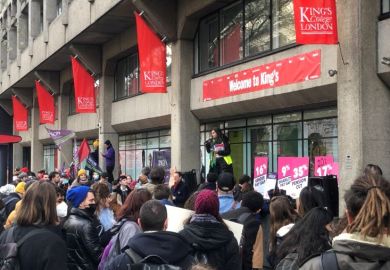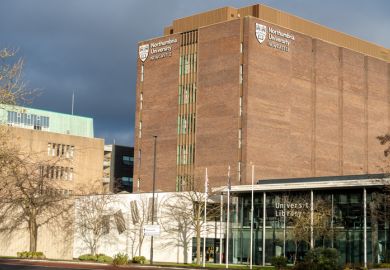Five more days of strike action this month affecting scores of UK campuses and more than a million students have been announced by the University and College Union.
The UCU is splitting the walkouts at 68 institutions across two weeks: staff at the first 38 will down tools from 21 to 25 March, with members at the remaining 30 manning the picket lines from 28 March to 1 April.
The announcement comes hot on the heels of the conclusion this week of 10 days of strike action that failed to persuade vice-chancellors to cancel cuts to pensions provided by the Universities Superannuation Scheme, or to improve this year’s pay offer.
The UCU, which expects more than 50,000 staff to walk out, said all branches would soon be reballoted for potential industrial action next term, and that preparations for a marking and assessment boycott were under way.
This sets the coming weeks up as a crucial test of UCU members’ resolve to continue the disputes. The Universities and Colleges Employers Association (Ucea) has claimed that action to date had resulted in only “low” levels of disruption to teaching. Managers said that in the first round of strikes, in December, just a third of UCU members eligible for industrial action then actually went on strike – equivalent to 9 per cent of total staff.
Low turnouts in the initial strike vote and subsequent reballots were seen by many as a sign of fatigue among members from the pandemic and years of industrial disputes, and concern about the impact on undergraduates who have seen their on-campus learning significantly interrupted. While a marking boycott coinciding with end-of-year assessments would increase the pressure on universities, it would also cause further significant disruption to students’ academic progress.
And members will also be worried about the prospect of universities continuing to dock their pay even after they return to work, if they refuse to reschedule cancelled lectures. Queen Mary University of London is continuing to dock 100 per cent of striking staff’s pay on these grounds, triggering a fresh strike ballot of local UCU members.
Jo Grady, the UCU general secretary, said vice-chancellors “could easily end this dispute and prevent further disruption in our universities, but they would rather attack the pensions, pay and working conditions of their own staff and damage the sector at the same time”.
“Students support staff because they know that staff working conditions are their learning conditions. They also know that universities have the money to give staff what they deserve. Until vice-chancellors get the message, staff will continue to take action to defend themselves,” Dr Grady said.
Forty-four of the 68 universities have mandates for strike action over USS pensions, but vice-chancellors marked the end of the latest walkouts by confirming the cuts to benefits that the UCU has estimated could reduce employees’ guaranteed retirement benefits by as much as 35 per cent, cutting members’ incomes after they stop working by thousands of pounds annually. Universities UK has countered that the average reduction would be 12 per cent, and that the increase in contributions that would go ahead otherwise would also have cost members dearly.
Other branches have a mandate focused on employers’ offer of a 1.5 per cent minimum rise for 2021-22, with unions demanding a £2,500 uplift instead, as well as action on inequality, casualisation and workload issues.
A UUK spokesman said the USS reforms had been “concluded” and that it was now time to “look forward”.
“February’s industrial action did not achieve the outcome UCU intended, and data gathered by Ucea suggests that turnout on picket lines was even lower than before, with limited disruption to students. With news of more strikes and yet another ballot, reasonable onlookers will conclude that the union has an ideological fixation with strike action and is determined to pursue it, no matter the cost,” the spokesman said.
“Since 2019, an average member of staff earning £55,000 per annum taking strike action has forgone over £4,800 in pay deductions, to no avail. Scheme members should ask themselves whether they are willing to sacrifice even more to pay higher pensions contributions based on UCU’s unsubstantiated view that another valuation will yield a better outcome.”
Raj Jethwa, Ucea’s chief executive, said it was “surely time for UCU to reassess and allow its representatives to engage constructively in this year’s multi-employer negotiating round, which begins this month”.
“The sector is extremely disappointed that UCU’s HEC [higher education committee] is trying to reignite yet another bout of strike action…UCU’s HEC cannot keep encouraging its members to target students who have endured so many recent disruptions,” he said.
Register to continue
Why register?
- Registration is free and only takes a moment
- Once registered, you can read 3 articles a month
- Sign up for our newsletter
Subscribe
Or subscribe for unlimited access to:
- Unlimited access to news, views, insights & reviews
- Digital editions
- Digital access to THE’s university and college rankings analysis
Already registered or a current subscriber?







